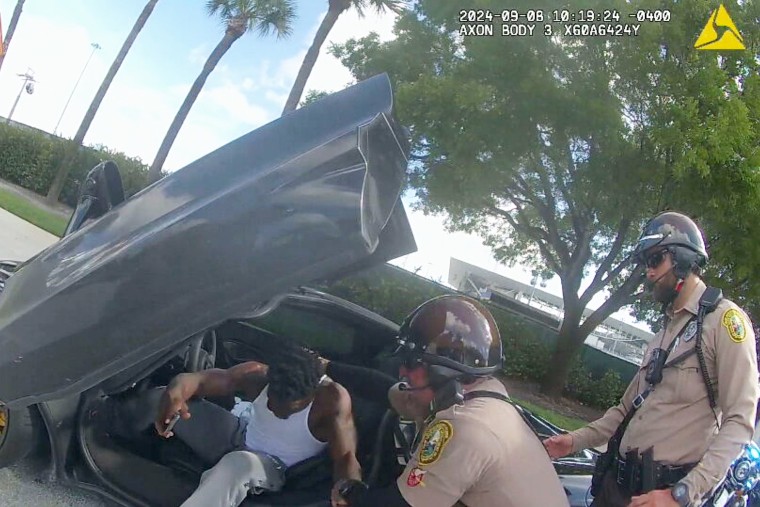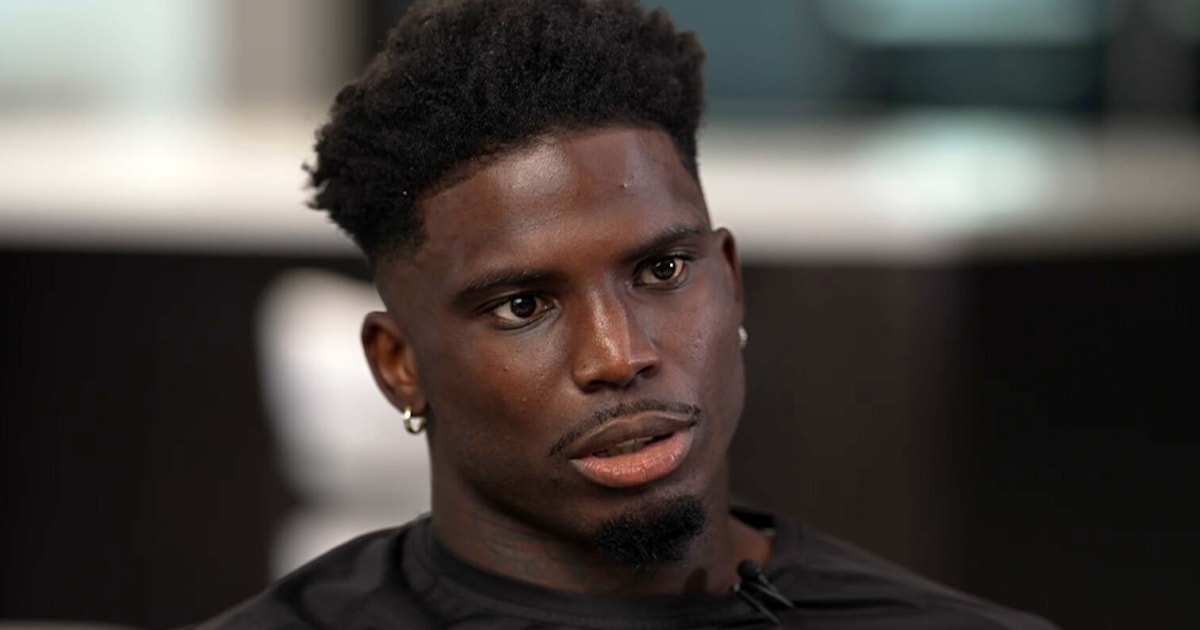Hours before the Miami Dolphins opened their season against the Jacksonville Jaguars Sunday, Miami-Dade motorcycle officers pulled over Dolphins wide receiver Tyreek Hill as he approached Hard Rock Stadium in Miami Gardens. Because Miami-Dade Police released 105 minutes of the officers’ bodycam footage, we all got to witness what happened: police forgetting their training, forgetting the mandates of their profession, surrendering to a macho impulse to dominate and, thus, creating a violent confrontation when nothing of the kind was called for.
It could have been a lot worse. But I say as someone who has supervised police in multiple cities that what did happen was just plain stupid and bad.
Give me my ticket, bro, so I can go. I’m going to be late. Do what you gotta do.
TYREEK HILL to OFFICER WHO PULLED HIM OVER
In the footage we see a black sports car tear by, and the officers pursue. We hear one officer tell Hill he had been speeding. At this, Hill rolls up his window. The officer responds by knocking on the glass, demanding that Hill roll it back down. Hill complains about the knocking, and the officer asks him why he’s not wearing a seatbelt. “Give me my ticket, bro, so I can go,” Hill says. “I’m going to be late. Do what you gotta do.”
This triggers another exchange about the window, followed by this from the officer: “We’re not playing this game.” He then opens the car door, pulls Hill out by the back of his head, forces him to the ground facedown, and, assisted by other officers, handcuffs him. “When we tell you to do something, you do it. You understand?” the officer says. “Not what you want, but what we tell you.”
The officers then move Hill to the curb and order him to sit down. When he does not immediately comply, the officer who had pulled him out of the car runs over to him and forces him down to the ground.
A cornerstone principle of modern policing is de-escalating confrontation. But as we saw in Miami on Sunday, too many officers have too often done precisely the opposite, and because of camera phones and bodycams, they have done so before audiences of millions.
From what we see from the bodycam footage, Hill appeared to be no threat. He gave the officer who asked for it his driver’s license and registration.
Once police identified him, they should have just written him a ticket and let him go on his way. There was no reason to pull him out of the car and force him to the ground.
In this case, the de-escalation attempt came from two of Hill’s teammates: Calais Campbell and Jonnu Smith, who appear on the scene and attempt to calm things down. After Campbell raises his hands in what appears to be a gesture of frustration, an officer shouts, “You want to be handcuffed, too?” And he is.
In the meantime, we hear an officer say to the one who had initiated the traffic stop: “You know who that is, right? That’s a Dolphins star player.”
With this, the encounter abruptly ends as more police and the head of security for the Dolphins arrive. Hill is cited for careless driving and failure to wear a seatbelt. Campbell is not cited. Hill made it to the game, finishing with seven catches for 130 yards and one touchdown in a 20-17 Dolphins victory.
The fact that everything ended abruptly when he was described as a star for the Dolphins lends credence to something Hill said in a news conference after Sunday’s game: “What if I wasn’t Tyreek Hill? Lord knows what that guy or guys would have done.”
In an interview with NBC News the next day, he said, “It just went from 0 to 60, man, from the moment that those guys pulled up behind me, knocked on my window, it went from 0 to 60 immediately.” In a Monday statement, the police department said it had placed Danny Torres, a 27-year veteran, on administrative duty as the department’s internal affairs unit investigates the matter.

There may be some apologists who try to cite Hill’s past encounters with the law as an excuse for what the police did Sunday. (Over about a 10-year period, he was suspected of committing domestic abuse, child abuse and of hitting a man in the back of the head during a dispute at a Miami marina. He pleaded guilty in the first case; he denied involvement and wasn’t charged in the second case; and he wasn’t charged but reached a settlement with the alleged victim in the third case.) But none of that had any bearing on what happened Sunday. We watched everything unfold on camera, including the initial officer being told who Hill was after he’d roughly handled him. Police have an obligation to stick to their training at all times.
A lesson we can take from Michael Brown’s 2014 death in Ferguson, Missouri; the murder of George Floyd in Minneapolis in 2020 and the homicide of Sonya Massey in Sangamon County, Illinois, in July is that a failure of police to properly de-escalate situations can lead to fatalities.
I joined the Miami-Dade police force in the wake of the 1980 Miami riots that followed four police officers beating Arthur McDuffie to death after a traffic stop.
I joined the Miami-Dade police force in the wake of the 1980 Miami riots that followed four police officers beating Arthur McDuffie to death after a traffic stop. The department was determined that nothing like this would ever happen again and backed a bold experiment in community policing that I was thrilled to be a part of. It looked to me like policing in America was turning a corner, as numerous departments began to embrace — often tentatively — the community policing concept and related doctrines, such as the use of de-escalation tactics.
But the cases of Brown, Floyd, Massey and so many other tragedies and near-tragedies makes me wonder: Are we going backward?
“When we tell you to do something, you do it. You understand? Not what you want, but what we tell you.” Was this moment of domination over Tyreek Hill the victory one Miami-Dade officer sought? Why else pull an unresisting man headfirst out of his car? Why force his body and face to the asphalt? Why handcuff him, unresisting as he was?
Will the video of police wrongly taking down Hill be forgotten in a matter of days? Will we be told, as we’ve been told so many times before, that what we saw was the work a “few bad apples?” That long ago ceased to be a credible explanation.
I know that many police officers and police executives have moved far beyond the practice of brutal, unthinking, policing. But too many remain. Hill encountered them Sunday. As I said, it could have been worse for Hill, but it was still plenty bad enough.
![]()







